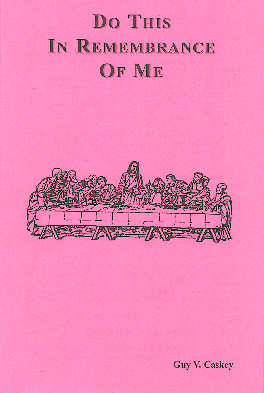
'In remembrance of Me'-Jesus Christ, then, takes up an altogether unique and solitary position here, and into the sacredest hours of devotion and the loftiest moments of communion with God, intrudes His personality, and says, 'When you are most religious, remember Me and let the highest act of your devout life be a thought turned to Myself.'

There is something to me infinitely pathetic and beautiful in looking at the words not only as the commandment of the Lord, but as the appeal of the Friend, who wished, as we all do, not to be utterly forgotten by those whom He cared for and loved and who, not only because their remembrance was their salvation, but because their forgetfulness pained His human heart, brings to their hearts the plaintive appeal: 'Do not forget Me when I am gone away from you and even if you have no better way of remembering Me, take these poor symbols, to which I am not too proud to entrust the care of My memory, and do this, lest you forget Me.'īut, dear brethren, there are deeper thoughts than this, on which I must dwell briefly. 'Do this,' is the true meaning of the words, not 'in remembrance of Me,' but something far more sweet and pathetic-'do this for the remembering of Me.' The former expression is equal to 'Do this because you remember.' The real meaning of the words is, 'Do this in case you forget' do this in order that you may recall to memory what the slippery memory is so apt to lose-the impression of even the sweetest sweetness, of the most loving love, and the most self-abnegating sacrifice, which He offered for us. So then, first, we have to think of it as a memorial of the past. I do not deal so much with the mere words of my text as with this threefold significance of the rite which it appoints. For the present, it is the symbol of the Christian life, as that great sixth chapter in John's gospel sets forth and for the future, it is a prophecy, as our Lord Himself said on that night in the upper chamber, 'Till I drink it new with you in My Father's kingdom,' and as the Apostle in this context says, 'Till He come.' It is to these three aspects of this ordinance, as the embodiment of all essential Christian truth, and as the embodiment of all deep Christian experience, covering the past, the present, and the future, that I wish to turn now. For the past, as the text shows us, it is a memorial of one Person, and one fact in that Person's life. It covers all time as well as all revelation and all Christian experience. Not only so, but in the simple primitive form of the Lord's Supper there is contained a reference to the past, the present and the future.

There is no room for any other rites, because these two, the rite of initiation, which is baptism, and the rite of commemoration, which is the Lord's Supper, say everything about Christianity as a revelation, and about Christianity as a living experience. The reason why these two, and only these two, external ordinances were appointed by Jesus Christ was, that, taken together, they cover the whole ground of revealed fact, and they also cover the whole ground of Christian experience. I do not stay to dwell upon the value of a rite contemporaneous with the fact which it commemorates, and continuously lasting throughout the ages, as a witness of the historical veracity of the alleged fact but I want to fix upon this thought, that Jesus Christ, who cared very little for rites, who came to establish a religion singularly independent of any outward form, did establish two rites, one of them to be done once in a Christian lifetime, one of them to be repeated with indefinite frequency, and, as it appears, at first repeated daily by the early believers. No reasonable doubt can exist, then, that within a very few years of our Lord's death, the whole body of Christian people believed that Jesus Christ Himself appointed the Lord's Supper. And so we are carried back to a period very close indeed to the first institution of the rite, by the words before us. It is intended to correct corruptions in the administration of the rite which must have taken some time to develop themselves. It presupposes a previous narrative which had been orally delivered to the Corinthians, and, as the Apostle alleges, was derived by him from Christ Himself.

It dates long before any of the Gospels, and goes up, probably, to somewhere about five and twenty years after the Crucifixion. The account of the institution of the Lord's Supper, contained in this context, is very much the oldest extant narrative of that event. 'This do in remembrance of Me.'- 1 Corinthians 11:24.


 0 kommentar(er)
0 kommentar(er)
